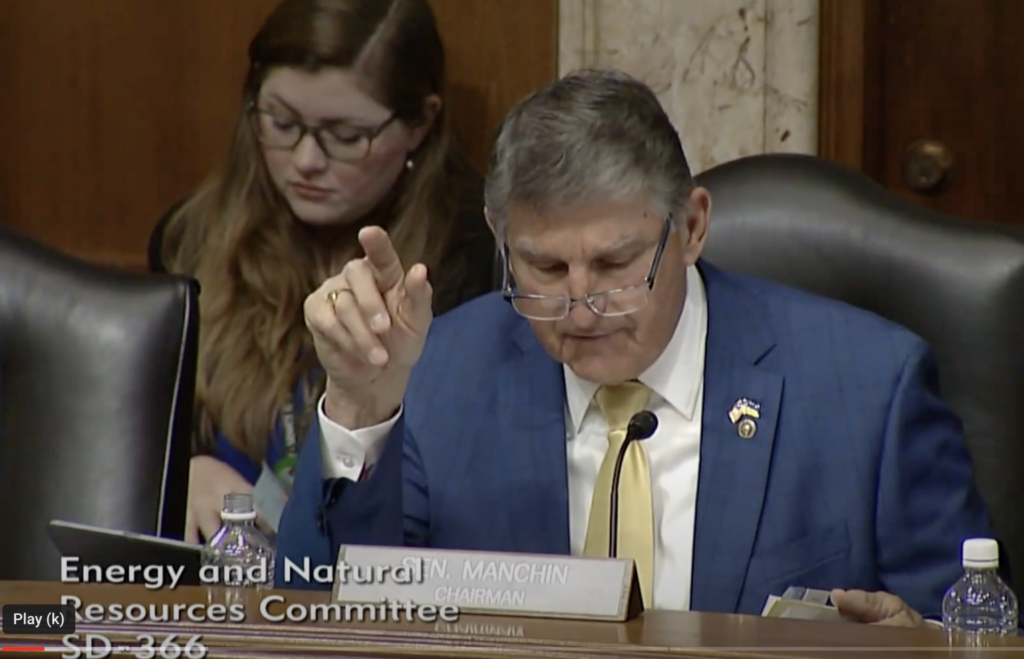Congress takes aim at the Nuclear Regulatory Commission: ‘It’s déjà vu all over again’
By Victor Gilinsky | February 12, 2024
 West Virginia Sen. Joe Manchin questions witnesses about advanced nuclear reactors in November 2023. Photo credit: screen shot of a US Senate video.
West Virginia Sen. Joe Manchin questions witnesses about advanced nuclear reactors in November 2023. Photo credit: screen shot of a US Senate video.
Politico reports that congressional promoters of “advanced” nuclear plants are blaming the Nuclear Regulatory Commission (NRC) as the main obstacle to their deployment. The report singles out Senate Energy and Natural Resources Committee Chairman Joe Manchin (D-WV) and cites his and his colleagues blocking the reappointment to the commission of Jeff Baran, who tended to lean toward safety more than his fellow commissioners, as the start of a campaign to bring the agency to heel. Such crude bullying of a safety agency, especially by people who don’t understand what it involves, is so obviously improper as not to need further comment. But there is more to the story.
The triggering event for Sen. Manchin’s ire appears to be the faltering of NuScale, the leading firm touting the development of small modular reactors (SMRs), and the most likely to succeed commercially. The NuScale reactor design had some hiccups in satisfying the NRC’s requirements for a license, but its fundamental problem was its inability to attract customers. That commercial failure darkens the prospects of the rest of the nuclear industry’s stable of “advanced” designs, whose variety makes licensing more difficult. Safety is a subtle business (think of the Boeing door problem) and depends on design details.
More fundamentally, at risk is the dream of the nuclear industry and the US Energy Department—spun out in hearings before the Senate Energy Committee—of building large numbers of such reactors and exporting them around the world, with the United States regaining undisputed global leadership in nuclear technology.
If this beautiful dream isn’t working out, somebody must be at fault, and who better to blame than the nuclear licensing authorities for paying too much attention to safety. If you think this way, the obvious fix is to reorient the NRC. Legislation to do that (ADVANCE Act, S-1111) has passed the Senate with strong bipartisan support. As Sen. Shelley Capito (R-WV), the act’s chief sponsor, put it: “we must establish regulatory pathways for next-generation nuclear designs to be approved quickly and without burdensome unnecessary costs.”
There is a sense here of “deja vu all over again.” The most prominent in the pipeline of “advanced” reactor designs are fast reactors. (Sidebar: They rely on fast neutrons and are cooled by liquid sodium, whereas all currently operating US power reactors rely on slow neutrons and are cooled by water.) The most prominent design of this type is TerraPower’s (Bill Gates’s) Natrium reactor. Despite its “advanced” label, this type of power reactor was developed by the US Atomic Energy Commission in the 1960s and 1970s. The prototype Clinch River plant, about the same size as Natrium, was then the country’s largest energy project. The AEC’s central goal, backed at the time by the powerful Joint Committee on Atomic Energy, was to shift US electricity generation to such reactors, starting around 1980. The advantage of these reactors is that, fueled with plutonium, there are enough excess neutrons to convert uranium in the reactor into more plutonium than is being consumed; thus it is possible to “breed” plutonium, hence the name “breeder reactor.” Natrium can be fueled in this way and likely would be if it gained wide acceptability.
Just as supporters of new “advanced” reactors see NRC safety licensing as a threat, so the AEC’s fast reactor developers saw that agency’s semi-independent reactor licensing division as standing in the way and sought to undermine it. (“Regulatory,” as it was called then, was split off from the AEC in 1975 and became the NRC. In time, the rest of the AEC became the Energy Department.) The licensing division was treated by the AEC commissioners as a stepchild and kept weak so as not to threaten the big-budget reactor project.
In the end, this strategy didn’t help the fast breeder reactor project. It got canceled because it didn’t make sense economically. But the weakness of the AEC regulatory organization had important consequences affecting the safety of the power reactors utilities bought in large numbers starting in the mid-1960s. Under pressure from the industry and commissioners, plants got licensed after rather skimpy safety reviews. So as not to constrain the licensing process, the AEC commissioners did not approve any safety regulations for power reactors until 1971. All but two of today’s 94 US operating power reactors were ordered before 1974. When it later became evident the early power reactors needed important safety upgrades, especially after the 1979 Three Mile Island accident, the nuclear industry resisted them.
In the late 1990s, it became evident that some of the plants’ safety documents—necessary for operation—were a mess. Then-NRC Chair Shirley Jackson tried to apply the NRC regulations strictly. The plant owners didn’t like this kind of oversight and got to New Mexico Sen. Pete Domenici, their senatorial godfather, who, in a private meeting, threatened Jackson with a huge budget cut. She got the point quickly, fired offending staff, hired Arthur Anderson management consultants to “improve” the licensing process, and ended the detailed public rating of nuclear power plants that the companies hated because Wall Street used the ratings for bond issues. After those changes, Domenici said he was happy. He boasted about coercing her in his book, A Brighter Tomorrow: “Since that meeting with Chairman Jackson, I have been very impressed with the NRC. They are now a solid, predictable regulatory agency.” There haven’t been many industry complaints since NRC fell into line—that is, until recently.
While the historical industry attacks on the NRC put self-interest above public safety, the agency, after its accommodating responses, didn’t come out looking good, either. A more recent change in the way the commission describes its responsibilities raises further questions about its priorities. It concerns the safety standard in the Atomic Energy Act (Sec. 182): “adequate protection of the public health and safety.” That phrase was cited by the agency for decades as the source of its authority and was the safety standard applied in commission actions.
Perhaps a dozen years ago, for reasons unknown but guessable, the commissioners began to use a modified version of the statutory standard, which now reads (for example, Strategic Plan 2022-2026) “reasonable assurance of adequate protection of public health and safety.” There is no denying that the added phrase waters down the Sec. 182 standard, which itself has not changed.
Do Nuclear Regulatory Commission actions under that modified standard even conform with the Atomic Energy Act? The Senate energy committee might usefully address itself to that question before it undertakes any more brow-beating of the already-timid NRC.
Together, we make the world safer.
The Bulletin elevates expert voices above the noise. But as an independent nonprofit organization, our operations depend on the support of readers like you. Help us continue to deliver quality journalism that holds leaders accountable. Your support of our work at any level is important. In return, we promise our coverage will be understandable, influential, vigilant, solution-oriented, and fair-minded. Together we can make a difference.















I’m in favor of nuclear power and I understand the new designs are much safer. I think many of us are still thinking about the nuclear waste problem. Surely by now science has come up with a solution.
The NRC should concentrate on insuring industry properly protects the public from dangerous radiation and dispense with the bureaucratic penchant for regulating matters well removed from that fundamental objective required by law.